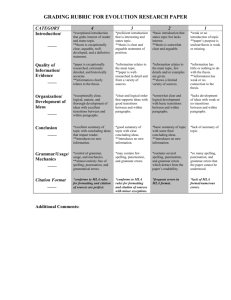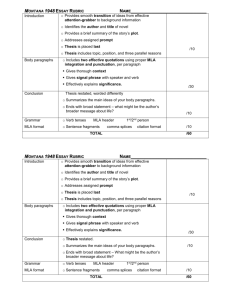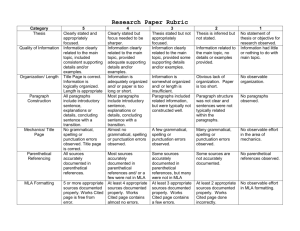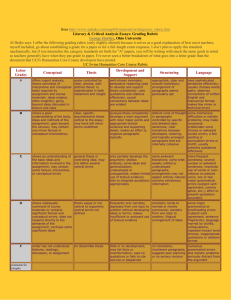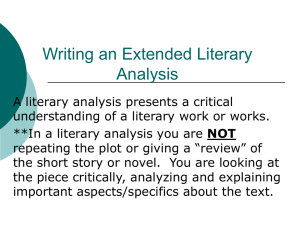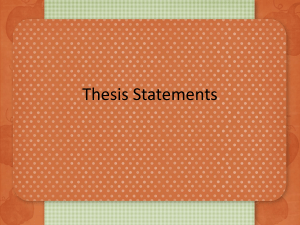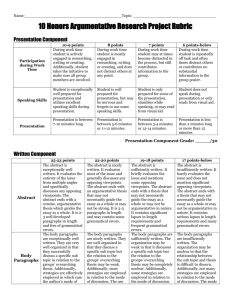Definition Essay
advertisement
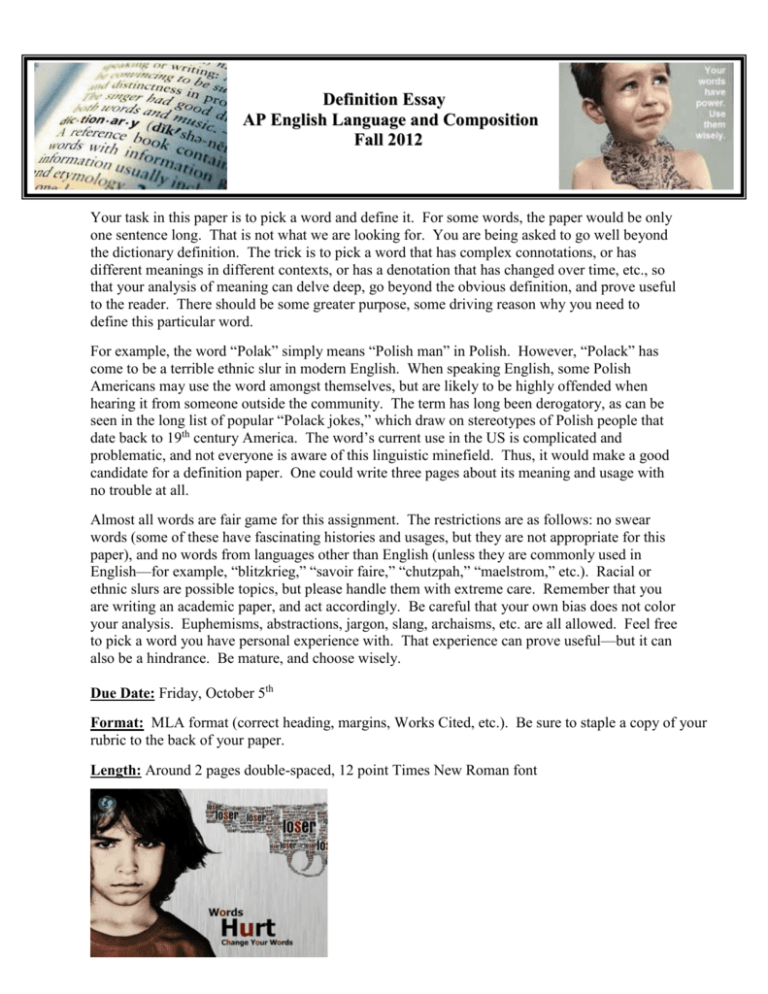
Definition Essay AP English Language and Composition Fall 2012 Your task in this paper is to pick a word and define it. For some words, the paper would be only one sentence long. That is not what we are looking for. You are being asked to go well beyond the dictionary definition. The trick is to pick a word that has complex connotations, or has different meanings in different contexts, or has a denotation that has changed over time, etc., so that your analysis of meaning can delve deep, go beyond the obvious definition, and prove useful to the reader. There should be some greater purpose, some driving reason why you need to define this particular word. For example, the word “Polak” simply means “Polish man” in Polish. However, “Polack” has come to be a terrible ethnic slur in modern English. When speaking English, some Polish Americans may use the word amongst themselves, but are likely to be highly offended when hearing it from someone outside the community. The term has long been derogatory, as can be seen in the long list of popular “Polack jokes,” which draw on stereotypes of Polish people that date back to 19th century America. The word’s current use in the US is complicated and problematic, and not everyone is aware of this linguistic minefield. Thus, it would make a good candidate for a definition paper. One could write three pages about its meaning and usage with no trouble at all. Almost all words are fair game for this assignment. The restrictions are as follows: no swear words (some of these have fascinating histories and usages, but they are not appropriate for this paper), and no words from languages other than English (unless they are commonly used in English—for example, “blitzkrieg,” “savoir faire,” “chutzpah,” “maelstrom,” etc.). Racial or ethnic slurs are possible topics, but please handle them with extreme care. Remember that you are writing an academic paper, and act accordingly. Be careful that your own bias does not color your analysis. Euphemisms, abstractions, jargon, slang, archaisms, etc. are all allowed. Feel free to pick a word you have personal experience with. That experience can prove useful—but it can also be a hindrance. Be mature, and choose wisely. Due Date: Friday, October 5th Format: MLA format (correct heading, margins, Works Cited, etc.). Be sure to staple a copy of your rubric to the back of your paper. Length: Around 2 pages double-spaced, 12 point Times New Roman font Name:____________________________ Period:__________ A Strong, clear thesis in the introduction Mentions the word on which the paper will focus AND the larger purpose for defining the word Purpose or value is truly important or valid Written in effective, sophisticated wording. B Clear thesis in introduction Mentions word and larger purpose May be more blunt or less eloquent than an “A” thesis. Purpose or value may be more trivial or less authentic C Serviceable thesis in introduction May be rather vague Word OR larger purpose suggested but not entirely clear. Purpose or value may be forced or awkward, and not authentic D Thesis difficult to find or out of place Thesis is insufficient: contains only one element, both elements are vague, or purpose does not make sense May be mismatched with content of the body paragraphs. F Missing No identifiable statement purpose or mention of word. * Evidence Vague generalizations instead of a well-supported argument Mostly claims with little to no evidence to back them up May contain factual errors Logical, linear paragraph order Paragraphs are internally cohesive and tie back to thesis Smooth transitions Adequate, but weak in spots: more specifics needed, more/better explanations needed, etc. Additional development strategies would have helped Only convincing in places, uneven Generic and not very thoughtful Formulaic or arbitrary paragraph order/progression Uneven paragraph development Formulaic structure Rough transitions Weak or flawed throughout. Vague support with few specifics Perfunctory explanations only May use only one definition strategy More like a list of synonyms than a developed argument supported by evidence Organization Few to no grammatical or spelling errors Correct MLA format Somewhat illogical progression of ideas Paragraphs poorly divided or developed Lack of topic sentences Missing transitions 10 or more grammatical or spelling errors: some major (comma splices, fragments, run-ons, etc.) Incorrect MLA format Illogical progression of ideas No paragraphs Missing transitions Format / Mechanics Fairly convincing, but less so than an “A” paper: more specifics needed, more/ better explanations needed, etc. Additional development strategies would have helped Could be better tied to topic sentences or thesis Some paragraphs not in most effective order Rather formulaic structure to paper or paragraph(s) Some awkward transitions 3-5 minor grammatical or spelling errors (subject-verb agreement, apostrophes, etc.) Mostly correct MLA format Language Clear, coherent prose Good, specific word choices Sentence lengths and structures vary Clear, coherent prose Slightly less precise word choices Sentence lengths and structures vary somewhat Overwrought or confusing prose Problematic word choices Sentence lengths and structures very basic or repetitive *Thesis Specific Appropriate Clearly explained Convincing Proves thesis Uses multiple strategies to define word: synonyms, negation, enumeration, analogies, origin and development, etc. 9-6 grammatical or spelling errors: some major (comma splices, fragments, run-ons, etc.) Incorrect MLA format Language hinders reader’s understanding Many problematic word choices Sentence lengths and structures very basic Multiple grammatical or spelling errors: many major (comma splices, fragments, etc.) No attempt at MLA format No Works Cited page Language erratic and hinders reader’s understanding Overall Grade: _______ * Categories weighted the most heavily
